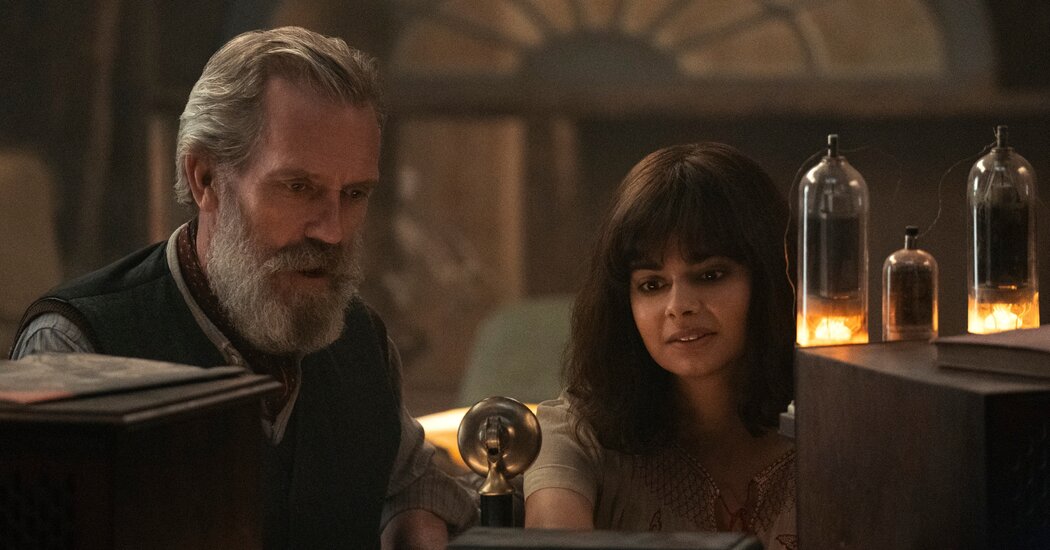Marie-Laure and Werner, the destined soul mates who will eventually meet in the Netflix mini-series “All the Light We Cannot See,” are on opposite sides of a cataclysmic divide. She is a French teenager delivering coded radio messages to the Allied bombing command in World War II; he is a young Nazi radio technician assigned to track her down in her Saint-Malo garret, as the bombs rain and American troops close in.
But in keeping with the sweepingly romantic, idealistic bent of the series and of the best-selling Anthony Doerr novel on which it is based, Marie-Laure and Werner have much in common. Both have met challenges — she is blind, he spent his childhood in an orphanage — and emerged tough and resourceful; Werner is a radio prodigy and Marie-Laure’s senses of touch, smell and hearing are extraordinary. And they share a mentor, an anonymous broadcaster named the Professor whose lessons, including, “the most important light in the world is the light you cannot see,” have helped to shape their characters.
These two paragons provide the framework for a deluxe iteration of the wartime melodrama and triumph-of-the-spirit tale, as imagined by Doerr and adapted for television by the screenwriter Steven Knight (“Peaky Blinders”) and director Shawn Levy (“Night at the Museum”). Marie-Laure and Werner are little people whose problems, when romanticized and cliffhanger-ized, amount to more than a hill of beans.
Their story has a foreground of suspense, terror and bloody violence but is elastic enough to include the search for a fabled gem said to confer a curse on the loved ones of anyone who touches it. Marie-Laure is supplied with not one but two lovable father figures: her actual father, who builds elaborate models of their neighborhoods so that she can memorize the streets, and his uncle, a hero of the World War I trenches whose ugly memories have kept him from leaving his house for 20 years.
If that makes the series sound dangerously cheesy and sentimental, well, it is those things, though not in fatal doses. There are melodramatic excesses — primarily involving a rotating cast of variously rabid Nazi officers — and convenient lapses of logic, but there is an overall level of restraint and wit in Knight’s screenplay that keeps “All the Light” from tilting completely over into shamelessness. If you are amenable to being manipulated in the service of an emotional workout, you probably won’t feel bad in the morning. And the production, filmed on location in France and Hungary, and involving a lot of nighttime battle special effects, is easy on the eyes.
The problem isn’t the material’s sentimentality or superficiality; it’s what has happened to the material in the process of being compressed into a relatively scanty (for Netflix) four episodes. The series feels starved of narrative oxygen, of the kind of texture and detail (present in the book) that could give it real life.
One result of this is an overemphasis on the theme embedded in the title — the light that lives inside Marie-Laure and the story’s other heroes, the light of reason that is snuffed during wartime, the light of our true selves that we must sometimes hide in order to stay alive. Doerr’s entertaining and intricate novel wasn’t one that called out for Cliffs Notes. On the other hand, there’s no guarantee that had the series been longer it wouldn’t just have been more of the same.
Even when they are asked to spit and sputter, the German and Austrian actors playing the Nazis are the class of the production, including Louis Hofmann (of the Netflix series “Dark”) as Werner and Lars Eidinger as the sadistic officer von Rumpel. Oddly, there are no French performers in prominent roles. The blind American actress Aria Mia Loberti, making her film debut as Marie-Laure, is likable, intelligent and a bit bland; Mark Ruffalo, as Marie-Laure’s father, strains with intermittent success for Gallic soulfulness. Hugh Laurie fares best, giving melancholy substance to the uncle, Etienne. But when he and Ruffalo offer each other a toast of “Vive la France,” all you can say is “Oh mon Dieu.”


